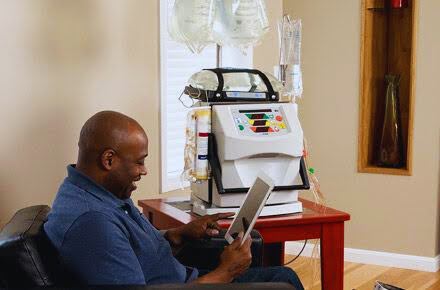Switching to Home Dialysis: A Simple Guide for You and Your Family
10/10/2025
When you first hear the word “dialysis,” it’s normal to feel uncertain, overwhelmed, or even fearful. Whether you’re newly diagnosed with chronic kidney disease or living with end-stage renal disease (ESRD), choosing the right dialysis treatment can feel like a life-altering decision. But here’s some encouraging news: more and more patients are finding freedom, comfort, and better health outcomes by transitioning to home dialysis.
If you’re exploring your dialysis options, this guide is for you. We’re breaking down everything you need to know, simply and clearly, about making the switch to home dialysis and how it could improve your quality of life.
Is Home Dialysis Right for You?
If you’ve ever felt tired of the routine of going to a dialysis center three times a week, or wish you had more control over your time and energy, home dialysis might be your answer.
Home dialysis is a safe, effective, and flexible treatment option for many patients with kidney failure. It lets you receive your dialysis treatment in the comfort of your home, often on your own schedule, with full support from your healthcare team.
According to the National Kidney Foundation, more patients are choosing to dialyze at home due to the flexibility and improved outcomes it can offer.
Want a deeper comparison of treatment styles? Check out our detailed guide on Comparing Home Dialysis to In-Center Hemodialysis to see how each option affects your lifestyle, comfort, and long-term health.
What Is Home Dialysis?
Dialysis is a treatment that removes waste and excess fluid from your blood when your kidneys no longer function properly.
There are two main types of dialysis:
- Hemodialysis (HD): Blood is filtered through a machine to remove toxins and fluid.
- Peritoneal Dialysis (PD): Uses the lining of your abdomen (peritoneal cavity) to filter your blood. (Note: At Dialyze Direct, we currently do not provide peritoneal dialysis.)

Home dialysis can refer to:
- Home Hemodialysis (HHD): ): Like in-center hemodialysis but done at home with a type of dialysis machine developed specifically for treatments at home.
- Continuous Ambulatory Peritoneal Dialysis (CAPD) or Continuous Cycling Peritoneal Dialysis (CCPD): Peritoneal dialysis treatments that are done often using a machine called a cycler.
Benefits of Home Dialysis
Patients who switch to home hemodialysis often report:
- More flexible treatment schedules
- Fewer dietary restrictions
- Improved energy and appetite
- Fewer hospital visits
- More time for work, family, and hobbies
Plus, performing dialysis at home can help you feel more in control and connected to your care team and treatment plan.
Who Can Start Home Dialysis?
Home dialysis is a great option for many, but not everyone. You may be a good fit if:
- You or your care partner can manage treatments safely at home
- You have space for equipment and supplies
- Your healthcare team feels you’re medically stable enough to handle it
- You’re committed to home dialysis training and learning how to use the equipment
Your nephrologist and care team will work with you to decide if this is the best treatment option for your lifestyle and medical needs.
How to Transition to Home Dialysis: A Step-by-Step Guide
1. Talk with Your Nephrologist
Discuss your interest in switching with your kidney doctor. They’ll review your health history and recommend the best dialysis modality for you.
2. Home Assessment
You’ll need a clean, safe space for your machine and supplies. Your care team will assess your home setup.
3. Surgery for Hemodialysis Access
To start hemodialysis, you’ll need surgery to create a vascular access point, usually a fistula or catheter.
4. Complete Home Training
You and your care partner will undergo several weeks of home training to learn how to:
- Operate the machine
- Mix and use dialysate
- Handle emergencies
- Follow hygiene protocols to prevent infection
5. Start Dialysis at Home
Once trained and approved, you’ll begin your home dialysis treatment with support from your dialysis care team.
What Does a Day on Home Dialysis Look Like?
Here’s a sample dialysis schedule for someone using home hemodialysis:
Morning: Wake up, check supplies, prepare your machine, and begin dialysis session
Midday: Dialysis session completes, remove catheter or needles, clean up equipment
Afternoon: Rest, eat a healthy meal, spend time with family
Evening: Review treatment log with your health care team via app or check-in call
Depending on your prescription, you might do shorter treatments daily or longer sessions a few times a week. Either way, home dialysis machines allow you to choose the treatment that fits your life.
Common Concerns About Home Dialysis
“What if something goes wrong?”
You’re never alone, your care team is available 24/7 for guidance and support.
“Is home dialysis hard to learn?”
Not at all. Most patients and caregivers master the routine in just a few weeks of home dialysis training.
“What about insurance?”
Many insurance plans, including Medicare, cover home dialysis treatment.
Why Choose Dialyze Direct?
At Dialyze Direct, we believe that dialysis should support your life, not control it. That’s why we specialize in home hemodialysis for patients in skilled nursing facilities and homes across the U.S.
We make the transition to home easier by offering:
- One-on-one support from your own healthcare team
- Easy-to-use home dialysis machines
- Personalized care plans
- Help navigating insurance and Medicare coverage
We proudly offer dialysis care that prioritizes comfort, dignity, and independence.
Learn More About Our Home Dialysis Services
You’re Not Alone on This Journey
Whether you’re already on in-center dialysis or just beginning your dialysis journey, know that you have options. Home dialysis isn’t just a treatment, it’s a lifestyle shift that can give you back your freedom, time, and peace of mind.
If you or a loved one is interested in home dialysis, talk to your nephrologist and contact our team at Dialyze Direct. We’re here to help you take control of your health, right from the comfort of your home.
Your kidneys may need support, but your life doesn’t have to stop
Ready to make the switch to home dialysis?
Talk to a Dialysis Expert Today
Frequently Asked Questions
Yes! Many dialysis patients successfully transition from in-center dialysis to home hemodialysis with proper training, equipment, and support from their healthcare team. Talk to your nephrologist to explore your options.
Home dialysis itself isn’t painful. Some patients feel mild discomfort from needle insertion, but the process of filtering your blood using the dialysis machine is typically painless and manageable.
Home dialysis has shown excellent success rates. Studies link it to better health outcomes, fewer hospitalizations, and improved quality of life compared to traditional in-center treatments for many patients.
Dialysis replaces lost kidney function, which is demanding on your system. Fatigue, blood pressure changes, and nutrient loss can occur, but many symptoms improve with a good care plan and home flexibility.
It’s easier than most expect. With proper home dialysis training, most patients and their care partners learn how to manage treatments confidently in just a few weeks.
References
- Home Hemodialysis Benefits and Technology
https://www.kidney.org/kidney-topics/home-hemodialysis
Details benefits like reduced medication needs, improved quality of life, and advancements in home hemodialysis machines (2025). - Home Dialysis Overview
https://www.kidney.org/kidney-topics/home-dialysis
Compares home vs. in-center dialysis, emphasizing flexibility, dietary freedom, and cardiovascular benefits (2025). - Home Dialysis Guide
https://www.kidneyfund.org/treatments/dialysis/home-hemodialysis
Outlines eligibility, training processes, and lifestyle considerations for home dialysis (2023). - Empowering Home Dialysis Workshop Report
NIDDK Workshop Summary (2021)
Discusses systemic challenges, training protocols, and equity in home dialysis access. - ESRD Payment and Home Dialysis Coverage
CMS Policy Update (2024)
Explains Medicare coverage for home dialysis machines and payment incentives under the ESRD Prospective Payment System. - Global Trends in Home Dialysis Adoption
Frontiers in Nephrology (2024)
Analyzes rising interest in home dialysis, regional disparities, and strategies to improve uptake. - Home vs. In-Center Dialysis Outcomes
PubMed (2019)
Information contained in this blog is for informational or educational purposes only and does not substitute professional medical advice or consultations with healthcare professionals. The content is not intended to be comprehensive or exhaustive, and it does not apply to any specific individual’s medical condition. Always refer to the personalized information given to you by your doctor, or contact us directly.

Dr. Allen Kaufman is the Chief Medical Officer and Senior VP for Clinical & Scientific Affairs at Dialyze Direct, with over four decades of experience in Nephrology. He began his career in 1980 and has held leadership roles including Chief of Nephrology & Hypertension at Beth Israel Medical Center (1998–2004), Chief of Dialysis at the Bronx VA Medical Center (1982–1990), and Chief of the Yorkville Dialysis Unit at Beth Israel and the Renal Research Institute (1990–2000). Dr. Kaufman has authored over 100 scientific publications and served as Principal or Co-Investigator on numerous NIH-funded research studies. A Fellow of the American College of Physicians, he is board-certified in Nephrology and Internal Medicine. He earned his medical degree from the University of Rochester and completed training at the Hospital of the University of Pennsylvania and Mount Sinai in New York. Dr. Kaufman is widely recognized with multiple “Best Doctor” and “Patients’ Choice” awards.